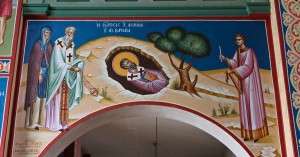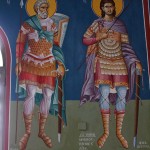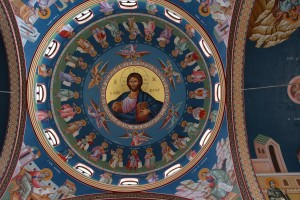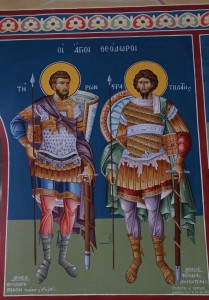Barnabas and Politics in Cyprus
October 16th, 2011
This morning, I could not help but notice the number of paintings of warrior saints on the walls of a large Orthodox Church. They provide a vivid reminder of the strong connection between politics and religion in Cyprus. Actually, in Cyprus, virtually everything has political implications. The first president of Cyprus was also the archbishop of the island.
Barnabas and Occupied Northern Cyprus
When I came to Cyprus in August on a Fulbright Research Grant to gather all available information on Joseph Barnabas, I simply could not come as a detached observer from the West. The identity of Barnabas as the founder of the Orthodox Church of Cyprus has many political implications. He is not merely a religious figure from the past. He is a living presence for many Cypriots who look to him to restore freedom to north Cyprus and let his spiritual children once again live in their ancestral villages and rebuild their lives and their churches.
In an introductory statement to a book by Marios T. Stylianou, the saintly Archimandrite Gabriel says the following concerning the 1974 invasion. The English translation in the book is awkward at times, but the intended meaning is quite clear.
“The Turkish Attila expelled the Greeks from the occupied areas and everything was deserted… The monastery of Apostle Varnavas [Barnabas] remained silent for 30 or so years abandoned in the hands of the occupation forces as a Museum. Now, after the opening of communication points with the occupied areas there is nostalgia for a mass to be held at his Tomb, where his grace made us worthy of celebrating mass in his honor and receive at this location the bright light of his blessed presence… His presence is live and He is responding to the claims of the faithful… Our saints live throughout time and are on our side helping us… I am glad that even now he [Barnabas] appeared to our dear Marios Stylianou, in difficult times of a struggle against foreign occupation, urging him to protect his historic personality… I wish the grace of the Trinity of God, by the intercession of the wishes of the most glorious Apostle Varnavas the Son of Supplication, help us rid our tormented country from the Turkish invasion and occupation and bring freedom to his Monastery allowing the return of those entitled to run it so that mass will be celebrated again and that the light of Orthodoxy will be radiated again from there.”[1]
Father Gabriel is one of the kindest and most generous men I have ever met. His followers view him as saintly and look to him for guidance in matters pertaining to all areas of life: spiritual, moral, psychological, and economic dimensions. He noticed the presence of numerous, single parents during church services at the monastery. One woman, for example, was a mother of six children. Her husband simply walked away from her, leaving her destitute (the divorce rate in Cyprus is higher than that of the United States). So Fr. Gabriel gathered his spiritual children and told them they must help. They started a benevolence fund and named it after St. Barnabas. For this wonderful man to speak of the “Turkish Attila” and to pray that Barnabas will rid Cyprus of the Turkish invaders reveals the depth of the feelings of even the most saintly Greek Cypriots toward Turkey.
Later in the same book, Archimandrite Photios S. Constantinou says the following regarding Barnabas.
“I do not know of any other Apostle to have honoured to such an extent his own country or to have appeared so loving for his country as our compatriot Varnavas. During his life he rid his compatriots of the detestable religion of pagans, teaching them the true religion of our Lord Jesus Christ. Dead he freed his country from the exploitation of the power loving and jealous Clergy of Antioch. Truly and without any doubt the Son of Supplication Varnavas fulfilled fully the motto: ‘Fight for Church and Country.’

Depiction of the discovery of the tomb of Barnabas in 488. Tradition states that Barnabas appeared to Archbishop Anthemius in a vision and explained where to find his body. This event is central for Cypriot religious identity.
“Thus, as Cypriots we have a great duty and owe a lot to the saviour of our souls to the benefactor and giver of our Ecclesiastical Glory! …. Concluding, let us wish that Apostle Varnavas, the founder and protector of our Church performs a miracle and Cyprus gets rid of the Turks from his own country that he loved so much and for the sake of which he became a martyr.”[2]
Such blending of religious and political concerns seems quite normal in Cyprus. Basically, the Orthodox Church is the church of Cyprus. Many Cypriots are quite secular and rarely attend sacred liturgy, but they are Orthodox. It is their national identity. To fight for the country is to fight for the church. Prayers to Barnabas for liberation are common.
When I conduct research on St. Barnabas, I am not dealing strictly with a figure from the past. I deal with a complex mix of history, theology, politics, and intense personal experiences expressed today. I simply cannot function as a detached historian when I examine the wide array of beliefs about Barnabas. His Orthodox, spiritual children see him as a great symbol of their ecclesiastical independence, a protector of the church he founded in Cyprus, a force for liberation of northern Cyprus from Turkish occupation, and a healer of the sick. From the New Testament, they also see Barnabas as an example of generosity. How does an outsider grasp such complexity?
[1] Apostle Varnavas: the Founder and Protector of the Church of Cyprus. Nicosia, Cyprus: Stylianou Publishing, 2005, p. 25
[2] Ibid, pp. 103-104, 106.
Posted in Uncategorized | Comments Off on Barnabas and Politics in Cyprus




